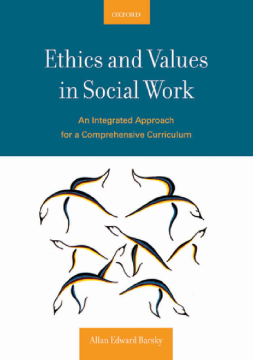
BOOK
Ethics and Values in Social Work : An Integrated Approach for a Comprehensive Curriculum
(2009)
Additional Information
Book Details
Abstract
In a unique and student-friendly package, Ethics and Values in Social Work offers a series of learning modules that will ensure graduates receive a comprehensive ethics and values education. Designed to be easily incorporated into any curriculum, each module helps students integrate the knowledge, skills, self-awareness, and critical thinking abilities required for dealing with ethical issues. From applying basic ethical standards of practice to managing complex ethical dilemmas, this textbook equips readers with a range of tools and strategies for responding to ethical questions and concerns. Traditional ethics textbooks provide students with a model for ethical decision making. This breakthrough textbook goes beyond ethical decision making by providing students with a strategic framework for managing ethical issues that includes guidelines for engaging others in ethical discussions and using conflict resolution theory to promote collaborative solutions. Some textbooks introduce students to ethical theories, such as deontology, teleology, and virtue ethics. This textbook goes beyond describing these theories by providing students with opportunities to apply, compare, and contrast these approaches as they relate to various contexts of social work practice. A wealth of case scenarios, discussion questions, and role-play exercises make this an engaging, thought-provoking teaching and learning tool. At a basic level, this textbook teaches students the essential principles and standards that define ethical practice. At a more profound level, Ethics and Values in Social Work inspires students to reach for the highest values of profession: service, dignity and worth of the person, human relationships, integrity, competence, social justice, human rights, and scientific inquiry. Format and contents help social work programs meet and exceed CSWE accreditation standards, providing a clear structure for integrating ethics and values content throughout foundation and advanced courses The six-stage framework for managing ethical issues provides a range of tools and strategies for identifying, analyzing, and responding to ethical problems, dilemmas, and breaches A developmental approach to learning ethics supports students in engaging in higher levels of understanding, abstraction, application, and synthesis of ethics material Experiential exercises prepare students for managing the ethical and values issues that may arise in field placements Fun, engaging activities encourage students to reflect, question, and apply theory to practice Thought-provoking and reality-based case examples illustrate thorny ethical issues that professionals may encounter, ranging from end-of-life decision making to boundary crossings to rationing resources during a national crisis
